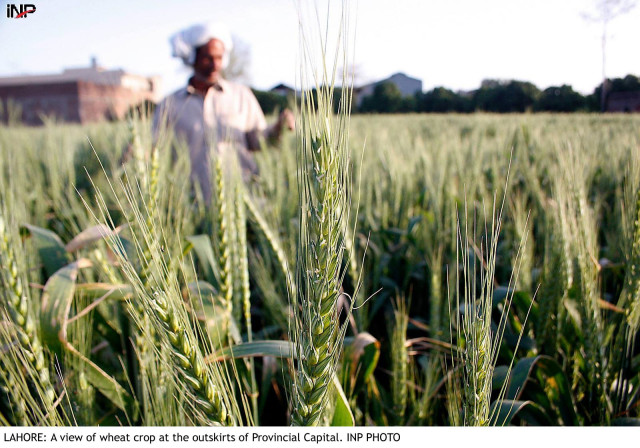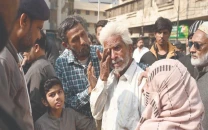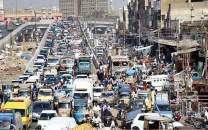Haris grow food, yet face hunger. Why?
Activists call for ensuring peasants’ food security, empowering women workers

They work hard all day in scorching heat to produce food. Yet, they survive on little. Deprived, ill-treated and downtrodden, they are your peasants and your haris.
Speakers, during a webinar organised by the Hari Welfare Association (HWA) on Saturday, in connection with the International Day of Peasants’ Struggle that is observed on April 17 every year, lamented this lack of food sovereignty among Pakistan’s peasants.
Food sovereignty is the people’s right to healthy food produced through ecologically sound and sustainable methods, and to define their own food and agricultural systems.
“It is the fundamental right of everyone, including peasants,” asserted HWA president Akram Ali Khaskheli during the webinar. This means, elaborated Khaskheli, that peasants had the right to define their own agricultural and fishing policies and ways to manage land, water, seeds, biodiversity and other resources.
Yet, he lamented, peasants were not the prime focus in any of the policies devised in Sindh, or even Pakistan.
Khaskheli pointed out that laws such as the Seed (Amendment) Act, 2015 and the Plant Breeders’ Rights Act, 2016, in fact, posed a threat to the traditional heritage and structure built on the foundations of free exchange of seeds and knowledge among peasant communities.
Taking the discussion forward, Shabnam Baloch, the provincial lead of the International Trade Centre’s Growth for Rural Advancement and Sustainable Progress project in Sindh, commented that food sovereignty was a serious issued in Sindh. And, she added, while there were laws for the protection of peasants, they were not implemented.
Baloch suggested giving land in the ownership of peasants as a way to ensure food sovereignty among them. But the very next instance, she voiced the dispiriting truism that majority of the agricultural land in Sindh, which she estimated to be around 80 per cent, was under the control of around five per cent families.
“To add to the misery, poor peasants don’t know about agricultural input funds and how to acquire them,” regretted Baloch.
Echoing the views of the previous speakers, Professor Muhammad Ismail Kumbhar of Sindh Agriculture University, Tando Jam said, “Sindh’s peasants and workers produce food, including wheat, sugar and rice, in abundance, but they don’t get the same food for their sustenance.”
Thus, declared, Prof Kumbhar, their food sovereignty did not exist.
He cited the example of women from Thar who travelled to other districts of Sindh, where they picked chillies, cotton, mangoes and watermelon. But they are not paid decent wages, he said.
Moreover, the professor stated, “Here, you will find every kind of court but peasant court to give justice to the deprived segment.”
Women’s dilemma
Sindh Commission on the Status of Women (SCSW) chairperson Nuzhat Shireen particularly highlighted the plight of women peasants in this regard.
“They [women peasants] do not have access to information about their registration under the Sindh Women Agricultural Workers Act 2020, they do not know how to unionise and they have no knowledge about accessing resources for food and livelihoods,” said Shireen. “Due to the lack of literacy among rural women, women peasants are neither able to read laws under which they are given rights, nor are they able to maintain a record of financial transactions with landlords.”
The SCSW head called for the Sindh government to prioritise the distribution of land among women peasants and added that a project launched by the government to distribute land among landless peasants had been unsuccessful for the very reason that women were not given priority.
“These women workers can only get their basic rights if they form unions under the Sindh Industrial Relations Act, 2013 or the Sindh Women Agricultural Workers Act 2020,” emphasised Shireen.
Women rights activist Rafia Gulani highlighted that women workers and peasants suffered the most during calamities, yet they were never compensated for the losses they suffered in the aftermath of floods and rains.
It is landlords who are compensated, she maintained.
Gulani stressed the provision of social security to all women working in the agriculture sector and the need for women workers to get organised under the two laws mentioned by Shireen.
Protection of rights
Abid Niaz Khan, the national project coordinator of International Labour Organisation’s (ILO’s) European Union-funded Trade for Decent Work Project, was of the view that while haris and peasants had multiple layers of legal protection, including human rights, tenancy rights, labour rights and socio-economic rights, the laws granting the rights, unfortunately, did not translate into practicality.
He highlighted the informality of work as a “big issue” of the Pakistani labour market.
According to Khan, workers can best protect their rights themselves by forming trade unions and trade union federations, engaging in social dialogue and bargaining for decent work conditions.
Besides, he said, the employers of agricultural workers and landlords also needed to be sensitised and engaged for offering ensuring better employments and work conditions as articulated in the Sindh Industrial Relations Act, 2013.
Pakistan Institute of Labour, Education and Research joint director Zulfiqar Shah said, “There is a dearth of struggles for peasants’ rights.”
Although non-governmental organisations are working in their individual capacities, he said, but there is no collective voice for the struggle.
“It is due to such gaps that peasants’ real issues, including slavery and debt bondage, are not highlighted,” he lamented, adding that it was the government’s duty to ensure that those who cultivated food and cotton should have enough to eat and wear.
Published in The Express Tribune, April 18th, 2021.



















COMMENTS
Comments are moderated and generally will be posted if they are on-topic and not abusive.
For more information, please see our Comments FAQ